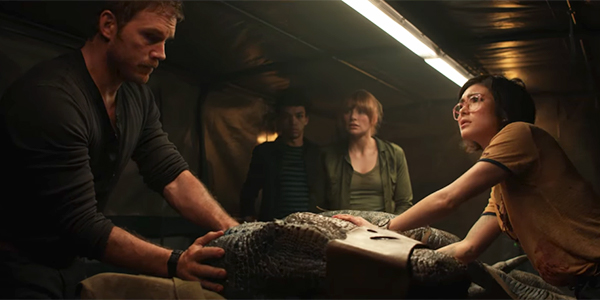Recently, it was revealed by Daniella Pineda, who stars in the new Jurassic World: Fallen Kingdom film that a scene revealing the homosexuality of her character Zia was cut.
The scene was reportedly cut due to timing issues because it “wasn’t relevant to the story”, reasoning that appears unconvincing to many due to the scene, as Pineda describes, being very quick, with only a short line revealing the sexuality of Zia. Whilst many movie scenes are cut for time, this is not the first time that a scene revealing the sexuality of an LGBTQ character has been cut from a film; last year actress Tessa Thompson revealed that a scene which made the bisexuality of her character explicit was cut from the final version of Thor: Ragnarok. Whilst the sexuality of Zia did not appear to be crucial to the plot of Fallen Kingdom, the continued ‘disappearing’ of characters like hers speaks to a larger issue of LGBTQ characters in mass media, and in film especially.
Lol Jurassic World cut a queer-confirmation scene for Zia because it was plot-irrelevant, even though that plot took about a trillion wacky detours.
— Adam Sass (@TheAdamSass) July 1, 2018
Although TV is progressing in its representation of LGBTQ characters, with GLAAD reporting that last year had the highest percentage of recurring LGBTQ characters on primetime TV ever, LGBTQ representation in film is rapidly dropping. Only 12.8% of last year’s major studio releases featured LGBTQ characters, the lowest percentage since the organisation began monitoring inclusion in media in 2012. Many of these characters have secondary roles or are almost entirely sidelined throughout their respective films, often being used as tokens or as joke punchlines and stereotypes. These statistics indicate the continuing problem of LGBTQ representation in Hollywood, and a further look at GLAAD’s report reveals another, more specific issue; out of the 14 ‘inclusive’ films, a significant 64% featured gay male characters as opposed to members of the lesbian, bisexual or transgender communities. In fact, there was not one transgender character in any of the 109 major studio films released last year, and whilst the number of lesbian characters in these films is increasing, there is still almost double the number of films featuring gay male characters compared to the number of films featuring lesbian ones. The lack of lesbian, bisexual or transgender protagonists in film is also an issue as although recent years have given us films like Moonlight, God’s Own Country and Love, Simon, all of which centre on gay male characters and all of which received widespread attention. Films that feature, let alone centralise those other members of the LGBTQ community are few and far between. That is not to say that the release of these films is in any way a negative thing; on the contrary, we need even more films like these in order to combat the continued sidelining of LGBTQ characters. However, it is not enough to advance LGBTQ representation by only focusing on one group in a very large community.
I really liked the thought that Zia in Jurassic World was lesbian, despite the scene revealing this fact was cut for time. I personally think that maybe they could spare seven seconds for that scene to unfold, but at least they thought about it #JurassicWorld2
— 🏳️🌈✨leo✨🏳️🌈 (@thatkpopweirdo) June 25, 2018
Romantic and/or sexual relationships are featured in some way in basically every film or TV show that is being put out, and with this centrality of romance comes the centrality of sexuality and thus the importance of representing people of every sexual orientation. For LGBTQ people to truly be and feel accepted, sexual orientations need to be normalised, and the TV and films we watch daily play a key role in this. LGBTQ peoples should not have to search high and low to find themselves represented; characters they can identify with should be presented outwardly to them in mainstream media the same way straight characters are, with TV shows and films often providing safe spaces for those experiencing homophobia or transphobia in their daily lives. In order to make steps towards fixing these issues of representation prevalent in Hollywood, we need to stop erasing or denying the sexual identities of characters like Pineda’s or Thompson’s, as there is no use ‘intending’ to include LGBTQ characters if they do not appear in what is finally presented to the public. This applies especially to lesbian, bisexual and transgender characters who need more exposure in order for mainstream media to accurately represent the diversity of our current society.
Hannah Stokes
Image courtesy of CinemaBlend

